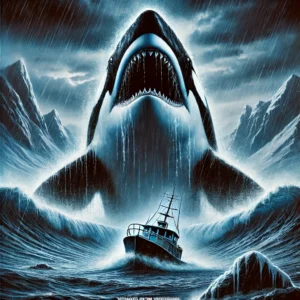Movie Orca: The Cult Classic You Need to Watch
Orca, the 1977 movie about a killer whale with a vengeance, has long held a special place in the hearts of cult film fans. Often overshadowed by the blockbuster success of Jaws, this underappreciated gem dives into deeper waters with its focus on themes like revenge, grief, and nature’s response to human interference. But what makes Orca a film worth watching? Let’s take a look!
The Plot: A Whale’s Quest for Revenge
At the center of Orca is a killer whale, or “orca,” seeking revenge on a fisherman named Captain Nolan. After Nolan kills the orca’s mate and unborn calf, the whale turns its sights on Nolan’s crew, leading to a dramatic showdown at sea. The movie doesn’t shy away from showing the intelligence and emotional depth of the whale, making it more than just another animal attack movie.
In many ways, Orca is more of a tragedy than a horror film. The whale’s quest for revenge isn’t mindless—it’s motivated by grief and the destruction of its family. The audience can’t help but feel for the whale, even as it wrecks havoc.
Why Orca Stands Out
While comparisons to Jaws are inevitable, Orca offers something different. Instead of portraying the animal as a mere monster, the film gives the whale a moral cause. It’s not just a creature of instinct, but a being with emotions, intelligence, and a sense of justice. This level of complexity is rare in the “creature feature” genre and is one of the reasons Orca has gained a devoted following over the years.
Another key difference lies in the film’s setting. Unlike Jaws, which mainly takes place near beaches, Orca sets much of its action in the cold, icy waters of Newfoundland. The bleak, frozen landscape adds a unique atmosphere to the film, reflecting the chilling emotions driving both the whale and Captain Nolan.
Grief and Revenge: The Real Themes of Orca

Beyond its action and suspense, Orca delves into deeper emotional territory. The film tackles grief head-on, showing how loss drives both human and animal alike. The whale’s grief over its murdered family is palpable, and Captain Nolan’s own journey through guilt and sorrow adds layers to his character. He’s not just a one-dimensional villain—he’s a man grappling with his own remorse.
Revenge is another key theme. However, unlike typical revenge stories, Orca challenges the audience’s sense of right and wrong. Who is the real villain here—the whale seeking justice or the human who disrupted the natural order?
Why Orca is Still Relevant Today
Orca remains relevant in today’s world of heightened environmental awareness. The film’s focus on humanity’s impact on nature, especially the consequences of exploiting wildlife, is a theme that resonates now more than ever. The portrayal of the whale as an intelligent, sentient being aligns with modern understandings of animal consciousness, making the movie feel ahead of its time.
It’s a reminder that nature isn’t something to be conquered, but respected. The film’s tragic ending serves as a cautionary tale about the dangers of meddling with the natural world.
Acting and Production: A Mixed Bag

While Orca has plenty of thematic depth, it’s not without its flaws. Some of the acting is a bit over-the-top, particularly Richard Harris as Captain Nolan. However, his larger-than-life performance adds to the film’s dramatic intensity. The special effects, while dated, still hold up surprisingly well for a 1970s film, especially when it comes to the whale sequences.
Director Michael Anderson, known for his work on Logan’s Run, manages to balance moments of tension with emotional storytelling, making Orca a film that lingers in the mind long after the credits roll.
Conclusion: Should You Watch Orca?
If you’re a fan of animal revenge films or simply curious about underappreciated cult classics, Orca is definitely worth your time. It’s a unique blend of horror, drama, and tragedy that offers much more than just a few cheap thrills. While it may not have the same iconic status as Jaws, Orca stands on its own as a thoughtful, emotionally resonant film that continues to captivate audiences decades after its release.
So, the next time you’re in the mood for something a little different, give Orca a watch. Just be prepared—you might find yourself rooting for the whale!














Post Comment